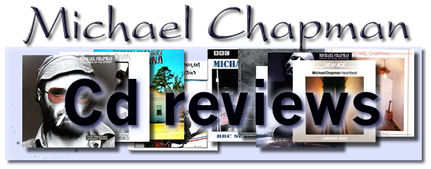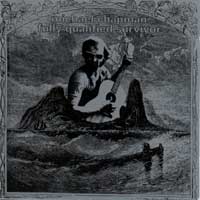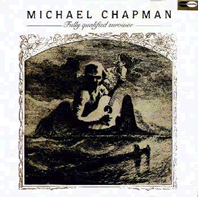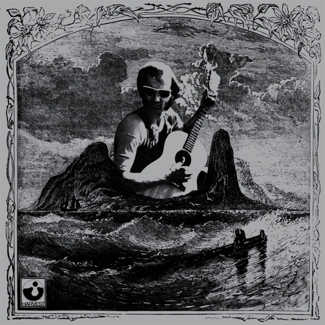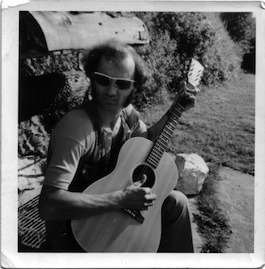|
This must surely
be the response of one of life's born romantics, who is continually
disappointed by the vagaries of life and frustrated by the inability
of things to be as they should. If it all sounds a little bleak,
Chapman at least manages to stoically take comfort in sitting with
his dog and making a young man's mock-heroic claim that at last
he's got his "loneliness together". For all the subtle
instrumentations and clever lyrical observations, we should never
forget that Michael Chapman is one of the most rhythmical and percussive
of guitarists - listen to "Soulful Lady" to hear how a
chord progression can be played with gusto on acoustic guitar, or.
the intro to "Trinkets and Rings" to hear how to make
a track groove. Finally, Chapman might not always be the most conventionally
tuneful of vocalists, but listen to the way he emphasises the word
"snide" in 'Stranger In The Room' and deny that his voice
communicates disgust better than any tutored vibrato ever could.
Michael Chapman today might be unfairly less well-feted than some
of his contemporaries, but he remains, in every sense, a fully qualified
survivor.
Written by Steven
Wilcock - originally published in Triste
Fully
Qualified Survivor
Michael
Chapman, apart from being a prolific English songwriter whose revered
work spans four decades, is probably the best guitar smith you have
never heard. While his skills are best evidenced on this album’s
predecessor, Rainmaker, the original songwriting and tight production,
seemingly informed by all music that came before it, steal the show
here.
It’s as
if every style of rock music were somehow harnessed and tamed into
Michael’s unique folk vision. The album sounds fresh as anything
recorded today, yet still of its time, sparkling with punchy drum
fills and orchestral arrangements. The album opens with an understated
triumph: experimental strings create a soundscape for the soothing
rhythm of “Aviator” to “take my time away.”
I cannot think of another 9 minute song that doesn’t seem to
last long enough. The lyrics on the album evoke a feeling of hopelessness,
and there is a kind of sad tone but all together I believe it can
be an uplifting album. This may be thanks to sharing much of the
same personnel responsible for early albums by Elton John and David
Bowie. During Fully Qualified’s hardest moments, though, I
hear a striking resemblance to Bowie’s classic Man Who Sold
The World.
“Stranger
In The Room” and “Soulful Lady” lend a classic rock
balance to softer songs like the immortal “Postcards From Scarborough“,
by far the most famous Chapman song. Through several interludes,
we are treated to Chapman’s masterful six-string suites. I
know my fair share of fingerpicking but still have trouble believing
that “Naked Ladies & Electric Ragtime” is actually
performed on one guitar by one person. In any case, it’s a
piece that should be standard fare in guitar workshops the world
over. But note that I’m not talking about the electric guitar
leads, performed by Mick Ronson who would later team up with Bowie,
for Space Oddity, thanks to this record.
Fully Qualified
Survivor is an exceptional collection of songs and your best introduction
to one of England’s great underappreciated artists
reprinted
from Aquarium Drunkard blog
Michael Chapman Fully Qualified Survivor
Most music fans carry around a mental short list of musicians who, in their minds, are woefully underappreciated not only by the general public but by other music fans. No matter what the genre--folk, metal, hip-hop, or whatever the latest permutation of electronic dance music is called--we can all think of a performer who in our estimation deserves wider name recognition and popularity. I'm no different, and there are plenty of people I can think of who deserve greater cultural regard (some names that spring to mind while I'm sitting here: Tony Hazzard, Tom Rapp, John Kongos, Roy Harper, Tim Hollier....). But today I'd like to single out one particular gentleman from my mental list and tell you why you should care about him.
That man's name is Michael Chapman.
Born and raised in Hunslet, a heavily industrial inner-city section of Leeds in the north of England, Michael Chapman started his professional life as an art teacher. He moonlighted as a guitarist, though, and it was a great time to be one in England, as people like Davy Graham and Bert Jansch were redefining the sound of acoustic folk music with their intricate fingerstyle playing. Chapman began to play the folk circuits in Cornwall and London in the late 60s. Perhaps it was his early environs, but Chapman seemed to have a natural facility for the blues, and his early sets leaned heavily on tunes like "See See Rider" and "Key to the Highway."
It wasn't long before Chapman was writing his own songs, though, and what songs they were. He seemed to have a world of living behind even his earliest efforts; it's a cliché to talk about how young singers sound like old singers, but Chapman's vocals had a grizzled, weary tone to them that perfectly suited his subject matter, which was reflective without being naval-gazing, and often dealt with the persistence of unhappy memories. His songs tended to focus on the aftermath of relationships gone sour, carefully sifting through regrets and recriminations to get to the truth behind the ways people construct and deconstruct their lives together.
One of these songs, the bar-setting "It Didn't Work Out," led off his first album, Rainmaker, released by Harvest in 1969. Rainmaker created the template for the rest of the albums that Chapman recorded for Harvest: mournful, lyrically acute songs mixed in with accomplished guitar instrumentals. The guitar instrumentals weren't filler, either; by this time, Chapman's fluid fingerstyle playing was just as accomplished as the playing of some of his better-known peers.
"Kodak Ghosts," the song featured in this post, originally appeared on Chapman's second album, Fully Qualified Survivor, from 1970. It's quintessential Chapman, and in this stripped-down version from his guest appearance on Hatch's show in 2005, you can hear how his skillful guitar playing propels the song's narrative about a guy sitting around after a failed relationship with only his dog for company (the dog is a nice Chapmanesque touch). He seems to be trying to convince himself that any effect the relationship had on him is over, even as he obsesses about his lover’s future partners and revisits old love haunts. The Kodak ghosts of the title are never mentioned, but you can imagine the old photos strewn on the guy's kitchen table, representations of a dead affair that continues to haunt his mind.
Before the song proper starts, check out that intro: Chapman jokes in his usual sardonic manner (live, he’s a very funny storyteller), and then he tosses off a few dazzling runs ornamented with harmonics that any other guitarist would kill for. For Chapman, it’s business as usual.
Chapman recorded four albums for Harvest, each one a gem and each one distinct from the other in its musical choices. In the mid-70s, he signed to Decca Records and moved in a rockier direction. Millstone Grit, the first of his Decca albums, signaled in its very title the way Chapman would go for much of the rest of the decade: tougher, harder, and louder. His electric period failed to set the world alight, however, and as the 80s and 90s went on, Chapman returned to a more folk and blues-based sound. He’s continued to make records at the rate of one every couple of years, and all of them have their merits; much like his contemporary Bert Jansch, who has continued to make good records while the world looks elsewhere, Michael Chapman has continued to be active artistically. His most recent release is called Time Past and Time Passing, released last year on Electric Ragtime Records
2009 Free Music Archive freemusicarchive.org
Michael Chapman, according to his bio, rose out of the Cornish folk circuit, which must have been a strange fit. His music surely has a melancholy feel that runs through plenty of traditional Cornish folk songs, but his biting edge and complex compositions must have surely made him an outlier. In fact, Chapman has been an outlier for much of his career, never quite garnering the praise he so deserved. But now, we’ve got a reissue of Fully Qualified Survivor, his sophomore album from 1970. It’s been out of print on vinyl for years. It’s never been issued on CD before. ( website ammendment first time on CD in USA, in europe/UK it has been reissued 3 times on CD and at least twice on vinyl )Oh, and it’s one of the best psych-folk records recorded. Ever.
Chapman’s first four albums came out on Harvest Records, an EMI-run British label that served as a hot bed for the psych-folk scene. It was home to, among others, Pink Floyd, Syd Barrett’s solo work, and fellow prog-folk singer Roy Harper—whose own 1971 album for Harvest, Stormcock, is a masterpiece. If you’re looking for a comparison to Chapman’s sound, Harper is as close as you’ll get, at least in some ways. The first track on Full Qualified Survivor, “Aviator”, does little to break that comparison. It’s a nearly ten-minute epic, as moody and wandering as anything on Stormcock, though if you’re looking for an album of huge suites, it’s a bit of a red herring.
After that huge, excellent, opening, Chapman continues to develop his own deep, vibrant sound. “Aviator” sets it all up for you; once you set aside the heft, you’ll hear how it falls right in line with the other, tighter songs that follow. We get Chapman’s smoky rasp of a voice, his subtly intricate guitar playing, and his eye for a sharp line, a sinister bark, and a striking detail. It’s a stunning piece about isolation and paranoia—everyone seems to be coming from all angles to “take [his] time away”, and you can feel the world closing in on him, not only in his weary voice but in the silence on the other end of a ringing phone or the stones thudding on the roof.
The solitary feel Chapman establishes is nothing self-pitying or fey. There’s bite to these songs. You can feel him sneer when, say, someone tries to make a fool of him in “Stranger in the Room”. “You made your snide remarks”, he snaps, nearly spitting out the words. Even “Postcards from Scarborough”—a much sweeter bit of melancholia and the closest thing Chapman had to a hit—finds him mourning a lost love while still scowling at his memories themselves. “The food was so tasteless, the wine was so stale”, he growls, remembering his days alone.
The lyrics are fully realized here, as well written as they are well delivered, but Fully Qualified Survivor is excellent because it is just as dynamic musically. Where other folk singers would rely on the acoustic guitar (and maybe some swelling strings or go the other route, the way Harper could) over building their songs with drifting layers, Chapman’s sound may align with the folk movement, but it is rock and roll at heart.
Chapman enlisted some Grade-A players for the record, including guitarist Mick Ronson. This six-string legend would also later work with Elton John and was of course part of David Bowie’s Spiders from Mars on top of having his own solo career, but his work on Chapman’s record is revelatory. Check the swelling run-ups that burst out of “Stranger in the Room”, not to the mention the solos. The thick riffs he drops on “Soulful Lady” are downright funky, while his gentle, distant work on “Rabbit Hills” adds an intricate layer of depth to Chapman’s already weary vocals. The sharpness of his guitar playing worked well with the complex basslines of Rick Kemp—the unsung hero of the record—who circles rumbling notes all around Chapman, giving the whole album a mossy rock feel we wouldn’t hear again—at least not at this brilliant level—until Neil Young’s On the Beach in 1974.
Chapman leaves plenty of room to show off his own chops, of course, and mixes up the mood and tempo of the record with a series of solo acoustic interludes. His playing on these is lightning-quick and arresting—particularly the bright “Naked Ladies & Electric Ragtime” and the stunning slide work of “Andru’s Easy Rider”—but it’s how these pieces manage to fit well in the seams between these full-band songs that makes them all the more striking. Fully Qualified Survivor is, well, just what its title claims. This is an album more than worthy of being unearthed and of being appreciated anew. It avoids sounding like anyone else—and, let’s be honest, the early-70’s singer-songwriter camp can feel a bit homogeneous. It also avoids the over-sentimental schmaltz in which some of his peers indulged (another occasional drawback to that crowd).
In a time where we’re constantly trying to recapture sounds from the past, any past, it’s great to stumble upon the genuine article, something that came before and that did all the things people are still trying to do. It’s heartfelt. It’s dark. It’s intricate but immediate, rocking but lush. It does all those things at once, and it does them better than most artists could hope to do any one of them. So is Fully Qualified Survivor a lost classic? Is it a reason to rethink Michael Chapman’s place in folk and rock music? To both questions: A resounding hell yes.
www.popmatters.com
This gorgeous 1970 folk-blues masterpiece teams a gnomic songwriter from Leeds with David Bowie's future guitarist (Mick Ronson), and Elton John's future producer (Gus Dudgeon) and string arranger (Paul Buckmaster). Boasting a cod-psychedelic cover printed in silver metallic ink, Fully Qualified Survivor displays Chapman's ragged, rambling style, marked by precise flashes of his acoustic guitar. Amid Ronson's solos and Buckmaster's sweeping orchestrations, he sounds like a blasted troubadour back from a long cosmic odyssey.
By Andrew Hultkrans March 2011
Fully Qualified Survivor
After the critical acclaim Michael Chapman received for Rainmaker in 1969, he followed up quickly in early 1970 with Fully Qualified Survivor, a record more adventurous and haunting than its predecessor, with added production flourishes and equally strong songs. Fully Qualified Survivor is the album that established Chapman as a folk troubadour. Leaving the guitar pyrotechnics largely locked in a shed, Chapman concentrated instead on his songwriting skills, and the sacrifice -- for this record anyway -- paid off. Leaving the lead guitar credits to a fellow Hull-man, Mick Ronson (who got his gig with David Bowie as a result of his playing on this album), with Rick Kemp making a return as bassist and Barry Morgan on drums, Chapman relied on no less than Paul Buckmaster -- then beginning to work with Elton John, among others -- to employ and arrange a small string section to fill out the songs. It paid off, netting him his only chart hit, "Postcards of Scarborough." However, the disc's opener, "Aviator," is the song that best embodies the spirit of the songwriter and album better than anything else on it. Aviator begins with a lilting violin entwined around a cello and a strummed guitar. Chapman intones his lyrics as a world-weary traveler who has come to the end of his days and looks back on the things he has seen, loved, and lost. The song has no refrain, and is sung like a poem, with stunning violin fills swooping and sweeping all over the place, and with the cello and Kemp's bass playing counterpoint to one another in a melancholic melody full of pathos and verve. Some of Chapman's finger-wild guitar shine is displayed in the laid-back rag "Naked Ladies & Electric Ragtime." Ronson, for the very first time on a recording, got to showcase his lead-guitar skills on the sweeping "Stranger in the Room," a meld of folk and rock that holds one of the best crescendos in the history of either music. Chapman's material is dark, unrelenting, and as seasoned as a seaman in its distance from the object of his distaste and affection. But it's the next track that held the magic for tens of thousands in the U.K. and has become Chapman's albatross. "Postcards of Scarborough," with its languid, acoustic guitars strummed and fingerpicked for a full minute before the strings and vocal kick in. It's a song that evokes the memory with all its bittersweet power. The lyrics are so picaresque the listener can "see" the scene unfold in the singer's mind. The stunningly long refrain is punctuated by a swell of strings and Rono's leads and gets carries into emotional-overload territory. Once you hear this song, with its notion of the protagonist having "Postcards from Scarborough to keep in my mind/To hide from where I've been/To help remind/Of time passed and time passing," you'll not be able to get its brokenness from your mind, nor will you know the how and the why of all that's transpired. There's regret and resignation, and perhaps the scant trace of bitterness, but no longing or yearning. It's Zen-like in its acceptance. The rest of the disc is solid as well, from the rocking, crackling "Fishbeard Sunset" to the poetic and opaque "March Rain" to the darkly hunted "Kodak Ghosts." It digs deep into emotional territory by way of tight, almost suffocating songwriting and killer arrangements, making this one of the defining Brit folk-rock albums of the period. It holds up well in the 21st century as a true testament to the excellence of Chapman's craft.
Thom Jurek Allmusic.com
Michael Chapman 'Fully Qualified Survivor'
A comedian friend Louis has a joke about how people travel not to expand their horizons but to confirm their worst stereotypes. Truthfully, few of us are able to interpret complicated experiences as a coherent whole. It’s a skill found in the best art. And maybe the occasional PowerPoint.
Michael Chapman demonstrated this gift early on. In 1970 he released his second album, Fully Qualified Survivor, a colorful scrapbook from a stylistic troubadour. The self-taught musician was lumped in the folk category because of the acoustic guitar in his hands and his performance resume. Yet his singing had an odd swagger. And his music reflected the full range of his experiences: from skiffle to bop jazz to rock. His tastes continued to spiral outward; he later opened for Cannonball Adderley and Emerson, Lake and Palmer. But these sensibilities also drove his albums and his career below the radar. Fully Qualified Survivor became a memory best associated with John Peel’s accolades and the debut of future Spider From Mars Mick Ronson.
Say what you will about today’s travelers, but they have access to unprecedented swaths of the musical soundscape. Light in the Attic expands its beat-heavy catalog by reissuing Chapman’s seminal sophomore effort. The new edition carries few bells and whistles, aside from liner notes featuring insights from Chapman and his bassist Rick Kemp. While reissuing Chapman’s debut album, Rainmaker, would have made chronological sense, Fully Qualified Survivor is a more widely recognized and better realized album.
As expected, the album’s highlights are its patient explorations. The nine-minute-plus “Aviator” encapsulates an easy morning rise or a winter’s eve indoors. A strolling guitar and a wandering violin and cello set up cool bass vamps in a marvelous exercise of creative instrumentation and attentive performance. By the time Chapman’s lazy drawl comes in, the band has sidled up to the crackling fire and the beat is already feeling the warmth of the brandy. The comparatively sparse “Postcards From Scarborough” clocks in at almost half the time, yet swells with the same interplay of elements, particularly between the lush strings and Ronson’s electric guitar leads. Chapman sounds slightly tipsy as his narrator recalls life on the road, while his band swoops in and out.
Chapman could have made Fully Qualified Stranger a solid set of similar, long-form narratives, but he sounds musically restless. Small nuggets of fun like the ragtime “Naked Ladies and Electric Ragtime” or the bluesy, slide-heavy “Andru’s Easy Rider” (presumably named for his wife) preface longer, heavier material, like the slow-roasted, conga-anchored “Trinkets and Rings.” He explores period hippy funk, particularly in the hip-shaking “Soulful Lady” and the riff-heavy “Strangers in the Room” wherein Ronson shines plenty as he responds to each of Chapman’s lines. Though these moments occasionally show the album’s age, the entire collection holds together like a quilt of memories.
Entering his 70th year in 2011 Chapman’s “play anywhere” credo remains in place. In January the musician released Trainsong: 1967-2010, a collection of re-recorded material from across his career. Just months before Chapman released his thirtysomething-ith album, Wrytree Drift, and paid tribute to the late Jack Rose by sharing a cramped, messy stage with the No Neck Blues Band. Considering the love Arthur Magazine shares for him, he is unsurprisingly scheduled to record for Thurston Moore’s Ecstatic Peace label. Yet Chapman’s visibility remains relatively subterranean. There is no small irony then that he has lived long enough to see the reissue of this presciently titled album. Maybe there’s a clue for us, one that can’t be found in Lonely Planet, on how to take it all in while we’re on the road.
Prefixmag
Michael Chapman 'Fully Qualified Survivor'
Michael Chapman's Fully Qualified Survivor was originally released in 1970 on EMI's Harvest imprint, home to Pink Floyd, Deep Purple, and Electric Light Orchestra. Rather than full-blown rock, Chapman's work lies much closer to Harvest's other musical dissidents: Syd Barrett, Roy Wood, Kevin Ayers, and, most notably, Roy Harper. Chapman recorded four albums for Harvest between 1968 and 1972, and Fully Qualified Survivor remains the classic and the best example of the artist.
Recorded in four days on an 8-track, the album has been rereleased in the U.K. and Europe many times over the past 40 years, but this is the first time it has been released by a U.S. label on CD and it is the first vinyl reissue anywhere in decades. Chapman stands out among stoner folk rock contemporaries for his remarkably pure guitar work. His playing has an individual voice, inventive and laid back without being lazy. It also doesn't hurt that a pre-Bowie Mick Ronson is slobbering electric guitar all over the album.
"Postcards of Scarborough" was the standout track in its day and remains a psych guitar folk masterpiece. Nine-plus minute opener "Aviator" is notable for its rambling pastoral lyrics; it could easily have fit in on Bob Dylan's Desire. The title track displays Ronson's guitar work in all its sometimes excessive glory. The missteps of the album appear on the shorter tracks, "Naked Ladies and Electric Ragtime," "Fishbeard Sunset," and "Andru's Easy Rider." While all three contain some magnificent guitar work, they are departures from what is otherwise an incredibly cohesive and great album. (www.lightintheattic.net)
under the radar
|
